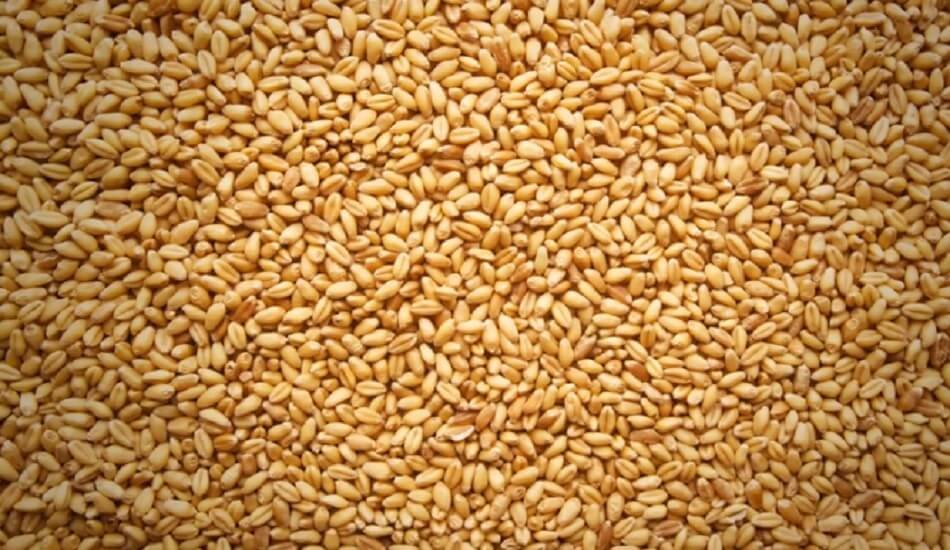Indian wheat is now more expensive than CBOT wheat futures.
After falling 6.5 percent last week, September and December wheat futures on the Chicago Board of Trade (CBOT), which is used as a reference rate in the global grains market, are currently ruling lower than the cereal’s price in India.
Domestic wheat prices are near record highs, despite global wheat prices being near a 52-week low. In the global wheat market, including CBOT wheat futures, Indian wheat is typically sold at a discount.
On August 20, the average weighted modal price (the rate at which most trades take place) was ₹22,840 per tonne, according to Ministry of Agriculture and Farmers Welfare data.
Also Read | India refuted the media allegation that it is set to import Wheat foodgrain.
CBOT September futures closed at $7.55 per bushel (₹22,160 per tonne) on August 19, while December futures closed at $7.72 (₹22,665). Wheat prices on the global spot market are near a year low, though they are higher than the Indian rate.
There are two reasons for the global fall
The International Grains Council reports that Europe wheat (French grade) costs $323 per tonne, while US Soft Red Winter wheat costs $318 free-on-board.
‘Wheat is currently available in India for ₹24,000-25,000 per tonne for fair average quality. Prices have fallen globally since Russia began selling wheat,’ said Pramod Kumar, Vice-President of the Roller Flour Mills Federation of India (RFMFI).
The drop in global wheat prices can be attributed to two factors. The first reason is the July 22 UN-brokered agreement to allow food commodity exports between Ukraine and Russia in the Black Sea region.
Since then, over 5.6 lakh tonnes of grains have been exported, despite wheat shipments totaling less than 50,000 tonnes. At least 27 ships have left the region, with seven more loading at three ports. ‘Black Sea region wheat is being offered at $385 per tonne plus freight,’ Kumar said.
Concerns about the impending recession
The second reason is a global sell-off by speculators and funds concerned about a global recession. According to the Food Policy Research Institute, the sell-off is concerning because it coincides with a drop in inventories.
‘The drop in CBOT will have no effect on Indian wheat prices.’ We must factor in freight and insurance. Also, how long will the window be open if the Centre allows duty-free wheat? It can only allow such imports for a limited time because the crop for the following year will be ready by then. ‘At most, this can provide a 50-day window,’ said trade analyst S Chandrasekaran.
Following the RFMFI’s concerns about rising wheat prices, Food Secretary Sudhanshu Pandey stated that the Centre is considering all options, including lowering wheat import duty to zero from the current 40% to imposing stock declaration orders.
Retail prices are up 18% year on year
‘Unfortunately, nothing has been done so far to control the prices, which are rising on a daily basis,’ Kumar of RFMFI said. Also Read | India might import wheat, a blow to Modi’s vision to feed the whole world.
Retail wheat prices are at a record high of ₹30.72 per kg, according to Consumer Affairs Ministry data, and atta (wheat flour prices) are at ₹35.24. Both prices are 18% higher than at the same time last year.
Wheat prices in the country have risen this year as a result of lower-than-expected production due to a heat wave that swept the country in March-April and increased demand for exports at the start of the season as the Russian-Ukraine conflict escalated.
Wheat production was initially estimated at 111.31 mt before being reduced to 106.34 mt. The Agriculture Ministry raised the production estimate to 106.84 mt in its fourth advance estimate. The US Department of Agriculture has also increased India’s wheat output estimate for this year to 104 million tonnes this month, up from 99 million tonnes last month. tender submissions
Wheat production figures are suspect, according to trade sources, because the cereal is in short supply. ‘It could be less than 100 mt,’ said a trader who did not want to be identified.
Bids are decreasing
‘There is no wheat available among farmers. In addition, the Centre’s decision to replace wheat with rice in the Prime Minister Garib Kalyan Anna Yojana (PMGKAY) in some States is putting pressure on the cereal,’ Kumar explained.
While Indian wheat prices are rising, bids in some countries’ import tenders have begun to fall, according to Rajesh Jain Paharia, a Delhi-based exporter. Jordan’s Ministry of Industry and Trade (MIT) decided last week to purchase 60,000 tonnes of wheat from US food giant Cargill for $385.50 per tonne. He expects the wheat to be delivered in the first half of February 2023.
On July 26, MIT finalized another tender, paying $405.75 to Cargill for a similar amount of tender to be shipped in the second half of December this year. At the same time, Bangladesh completed a tender that ended on July 14, with the winning bid of $476.38 per tonne.
‘If the current trend of global price declines continues, domestic wheat will face pressure because imports will become viable,’ Chandrasekaran said. Also Read | At WTO, India wants permanent solution to food grain buffer stock dispute.
Demand for exports
Domestic prices, according to some in the trade, could fall if the Centre reduces import duties. In contrast, India was expected to export more than 10 million tonnes of wheat in March and April this year. Due to the Ukraine war, Indian wheat was in high demand, but an unexpected drop in production resulted in the Centre prohibiting the grain’s export beginning on May 13.
By May 13, India had shipped over 2 million tonnes of wheat, with 1.4 million tonnes exported in April. According to data from the Agricultural and Processed Food Products Export Development Authority, 3.33 million tonnes of wheat were exported between April and June, worth ₹8,271.60 crores.
Though the Centre prohibited exports, it permitted shipments for which irrevocable letters of credit were opened prior to the ban’s imposition.
(Inputs from Agency)


















Add Comment